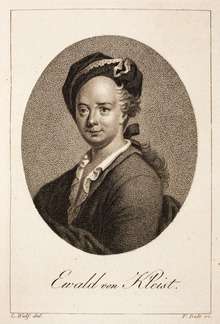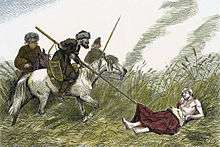Ewald Christian von Kleist
.jpg)
Ewald Christian von Kleist (March 7, 1715 – August 24, 1759) was a German poet and officer.

Life
Kleist was born at Zeblin, near Köslin (Koszalin) in Farther Pomerania, to the von Kleist family of cavalry leaders. After attending the Jesuit school in Deutsch Krone (now Wałcz, Poland) and the Danzig Gymnasium, he proceeded in 1731 to the University of Königsberg, where he studied law and mathematics. On the completion of his studies, he entered the Danish army, in which he became an officer in 1736. Recalled to Prussia by King Frederick II in 1740, he was appointed lieutenant in a regiment stationed at Potsdam, where he became acquainted with J. W. L. Gleim, who interested him in poetry.
After distinguishing himself at the Battle of Mollwitz (April 10, 1741) and the siege of Neisse (1741), he was promoted to captain in 1749 and major in 1756. Quartered during the winter of 1757-1758 in Leipzig during the Seven Years' War, he found relief from his irksome military duties in the society of Gotthold Ephraim Lessing. Shortly afterwards in the battle of Kunersdorf, on August 12, 1759, he was mortally wounded in the forefront of the attack, and died at Frankfurt (Oder) on the 24 August 1759.

_-_2.jpg)
Poetry
Kleist's chief work is a poem in hexameters, Der Frühling (1749), for which Thomson's Seasons largely supplied ideas. It earned him the nickname "the Poet of the Spring." In his description of the beauties of nature Kleist shows real poetical genius, an almost modern sentiment and fine taste. He also wrote some charming odes, idylls and elegies, and a small epic poem Cissides und Paches (1759), the subject being two Thessalian friends who die an heroic death for their country in a battle against the Athenians. Likewise he composed epitaphs for his many friends who were killed in battle, such as Major Heinrich von Blumenthal which eerily foretold his own:
Witz, Einsicht, Wissenschaft, Geschmack, Bescheidenheit,
und Menschenlieb und Tapferkeit,
und alle Tugenden vereint mit allen Gaben
besass der, den man hier begraben.
Er starb für's Vaterland
er starb mit Heldenmuth.
Ihr Winde wehet sanft,
die heilige Asche ruht.Wit, perception, learning, taste, modesty,
and kindliness and courage,
and all virtues united with all gifts,
had he who lies here buried.
He died for the Fatherland,
he died with heroic courage.
Ye winds sough softly,
the holy ashes are at rest.
Kleist published in 1756 the first collection of his Gedichte, which was followed by a second in 1758. After his death his friend Karl Wilhelm Ramler published an edition of Kleist's Sämtliche Werke in 2 vols (1760). A critical edition was published by August Sauer, in 3 vols (1880–1882). See also Arthur Chuquet, De Ewaldi Kleistii vita et scriptis (Paris, 1887), and Heinrich Pröhle, Friedrich der Grosse und die deutsche Literatur (1872).
References
| Wikisource has the text of the 1911 Encyclopædia Britannica article Kleist, Ewald Christian von. |
-
 This article incorporates text from a publication now in the public domain: Chisholm, Hugh, ed. (1911). "article name needed". Encyclopædia Britannica (11th ed.). Cambridge University Press.
This article incorporates text from a publication now in the public domain: Chisholm, Hugh, ed. (1911). "article name needed". Encyclopædia Britannica (11th ed.). Cambridge University Press.